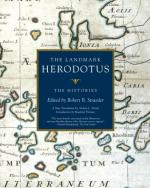|
This section contains 13,459 words (approx. 45 pages at 300 words per page) |

|
SOURCE: "The Imperialist Impulse," in Herodotus, Explorer of the Past: Three Essays, Princeton University Press, 1991, pp. 9-40.
In the following essay, Evans discusses Herodotus 's treatment of the causes of the Persian invasion of Greece, focusing on the imperialist motives of Xerxes, the fall of Croesus, and the concepts of nomos, aitia and fate that colored Herodotus's account of the Persian Wars.
Nine years after their defeat at Marathon, the Persians were ready once again to invade Greece. The Greeks owed a debt of gratitude to Egypt for the delay. For three years after the defeat, Darius had prepared a new assault to wipe out the disgrace, but then Egypt had risen in revolt, and in 486 b.c., Darius died; Xerxes succeeded him and the rebellion was not crushed until 484. Then Xerxes called a synod of the Persian magnates. It was a congress that Herodotus recreated with imaginative...
|
This section contains 13,459 words (approx. 45 pages at 300 words per page) |

|


